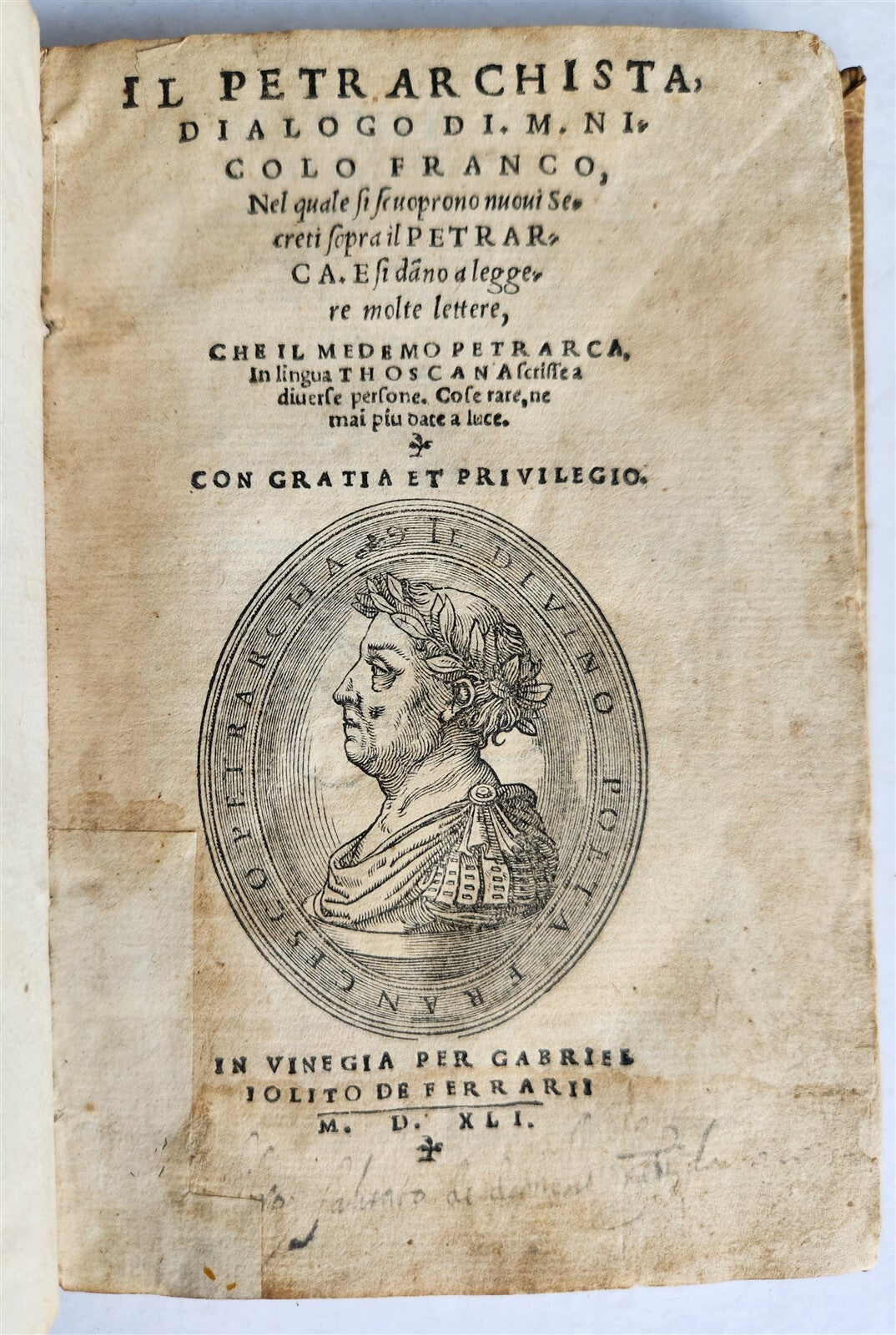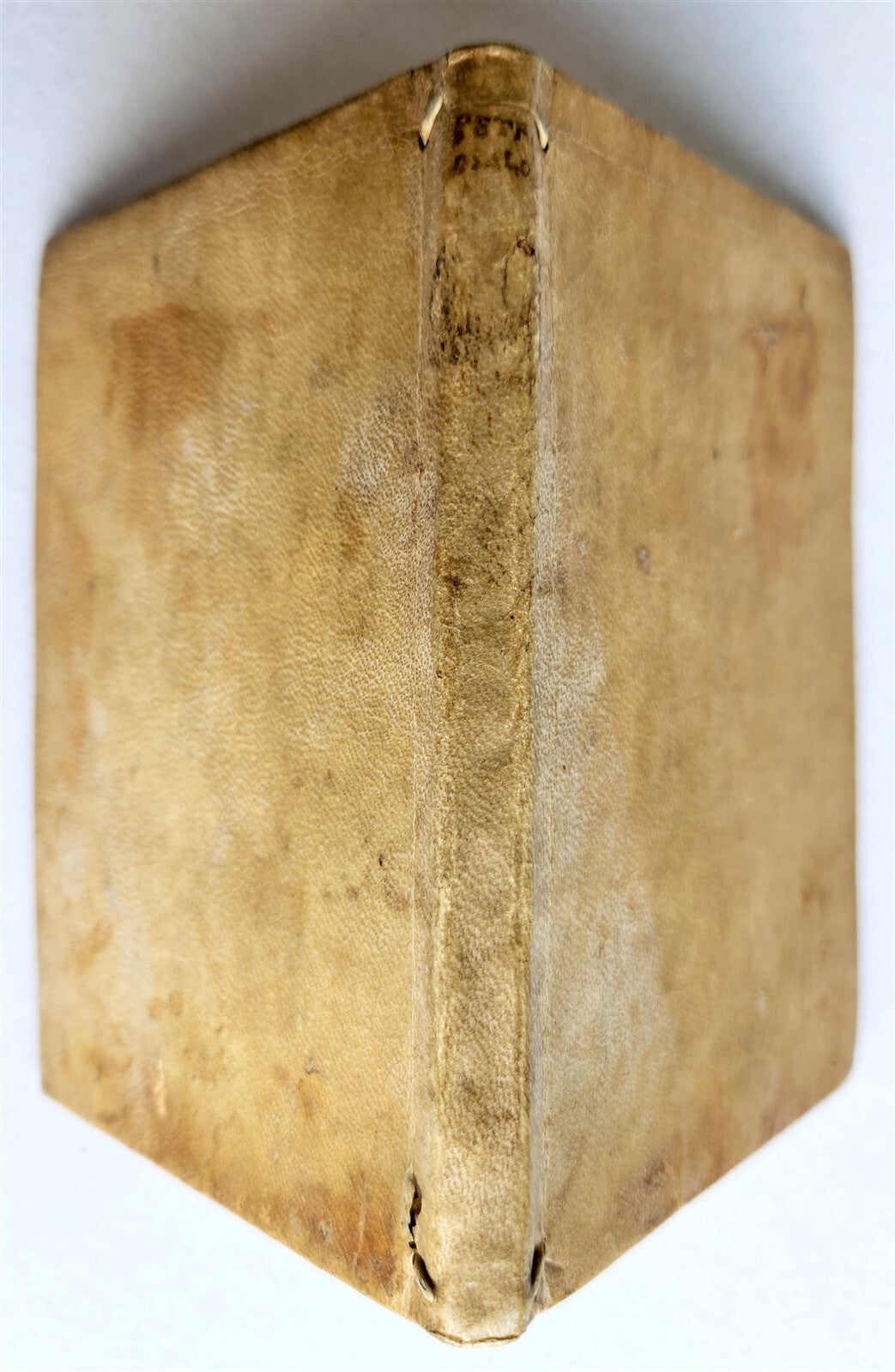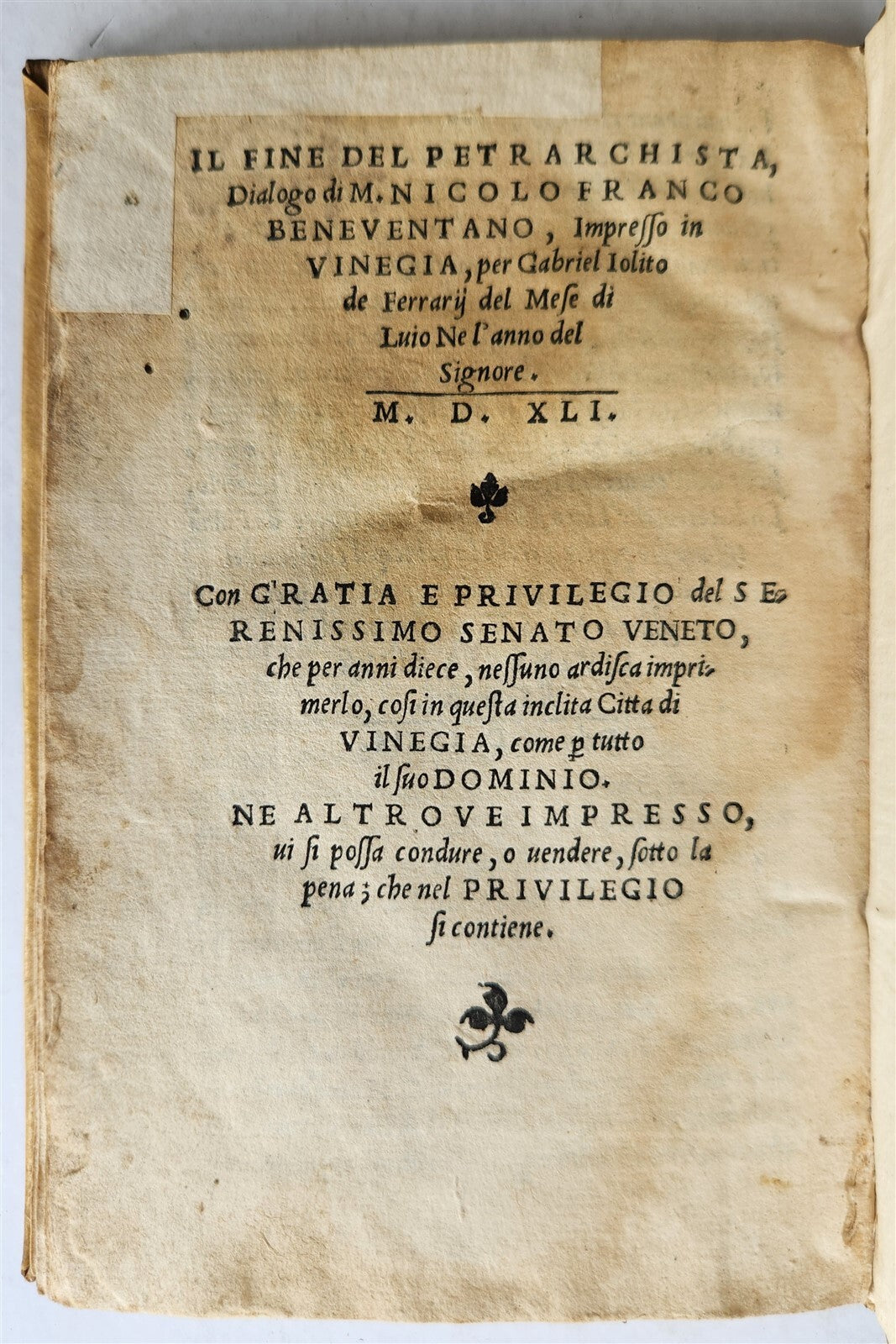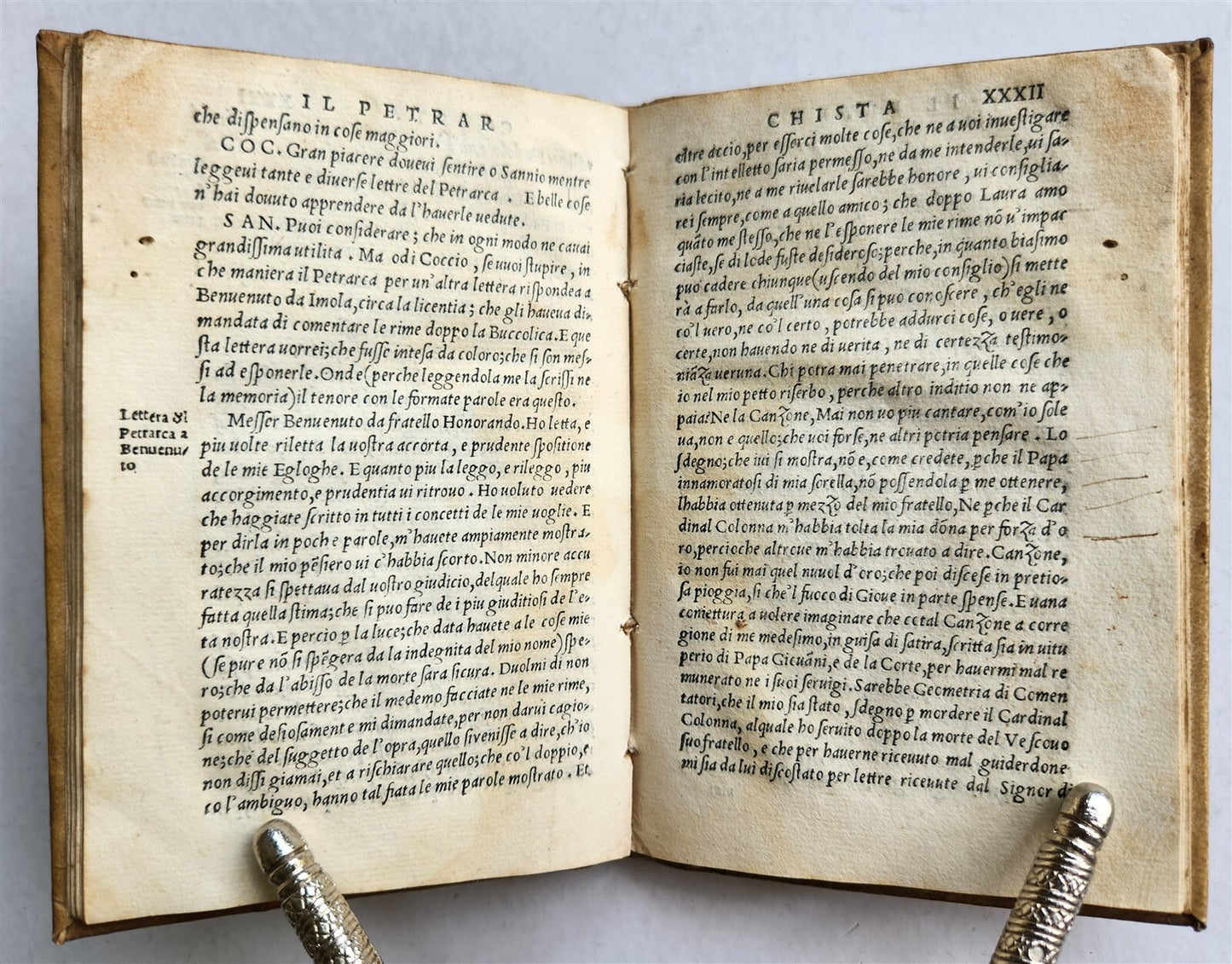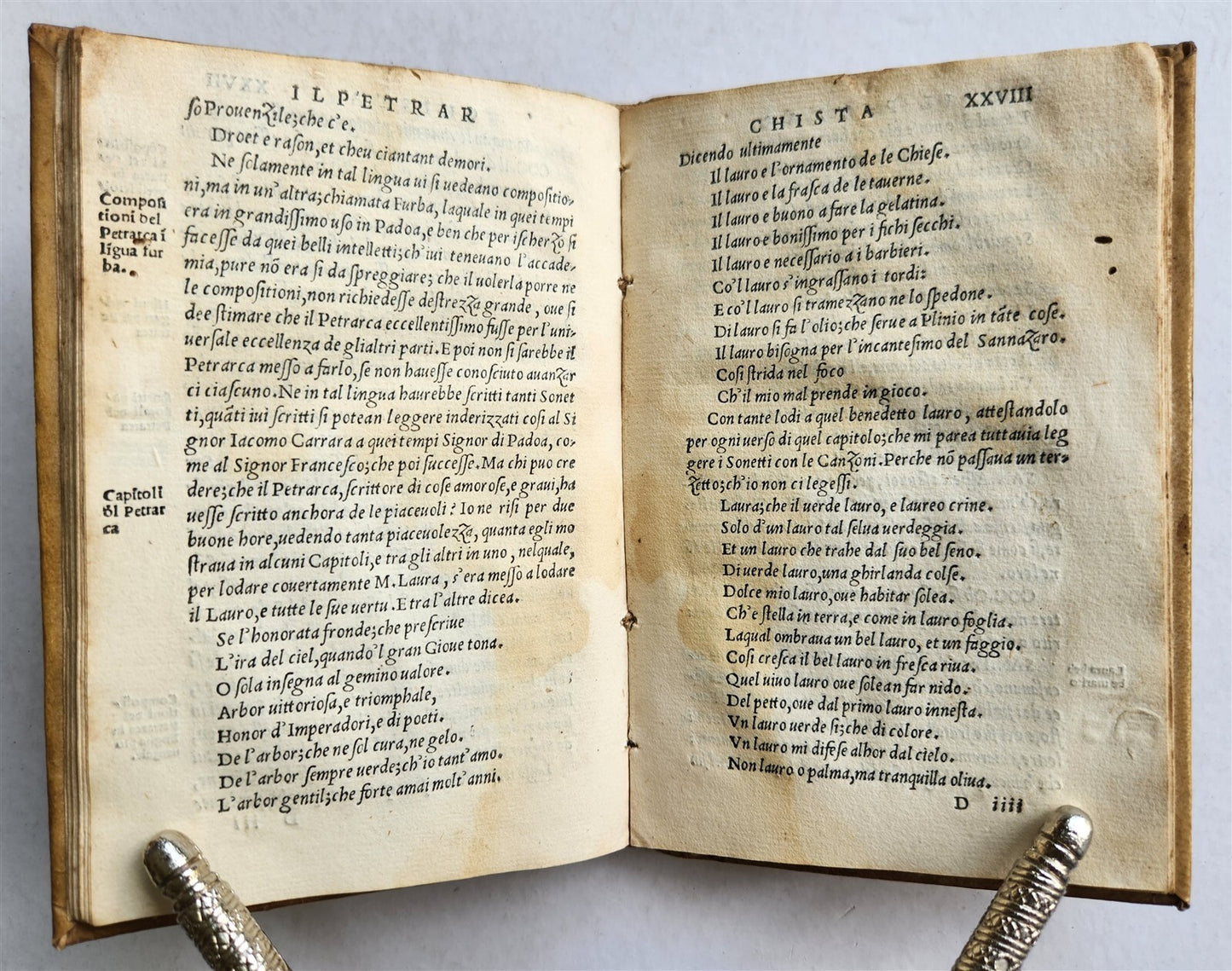Motka
1541 THE PETRARCHIST by NICOLO FRANCO antique 16th CENTURY vellum bound
1541 THE PETRARCHIST by NICOLO FRANCO antique 16th CENTURY vellum bound
Regular price
$424.90 USD
Regular price
$607.00 USD
Sale price
$424.90 USD
Unit price
per
Couldn't load pickup availability
FRANCO, Niccolo Il Petrarchista, dialogo ...Venice: Gabriele Giolitto de Ferrari; 1541Woodcut portrait of Petrarch on the title page, woodcut initials Repaired margins of the first 4 and 1 last leafSome toning and dampstainsFull vellum binding, manuscript title on the spine Provenance: - ownership note period with the title page- NB (private stamp on the back of the title page) Size 4 by 6 1/8 inchesText in Latin=============================Niccolo Franco (1515 – 1570) was a poet and literato executed for libel.Born in Benevento to a modest family, Franco completed humanistic studies at the school of his brother Vincenzo.In his youth he made friends with his compatriot Antonio Delli Sorici.In 1544 he moved to Naples where he undertook legal studies, coming into contact with the jurist Bartolomeo Camerario.In Naples he wrote a hundred Latin epigrams in honor of Isabella di Capua, wife of Ferrante I Gonzaga.In 1536 he moved to Venice, as a guest of Benedetto Agnelli, speaker of the Duke of Mantua.In August of the same year he published the poem Il tempio di Amore in octaves.Carlo Simiani showed that Il Tempio di Amore was actually plagiarised by Franco from the Neapolitan Iacopo Campanile, known as ‘Capanio’.The following year he entered the service of the famous writer and poet Pietro Aretino. Given his predisposition to letters, no less than to invective, Franco soon became the secretary of Aretino and, after a few years, he decided to go freelance, offering his services to well-known personages of the day.Aretino was averse to this initiative and after some verbal or written exchanges, the dispute ended with Franco receiving a dagger blow to his face from Ambrogio Eusebi, the friend of Aretino, that left him scarred, and resulted in his decision to move to another city. He travelled the Italian peninsula offering his services to various gentlemen and lords (Casale Monferrato, Mantua, Cosenza, Naples) arriving in Rome in 1558.While in Rome he thought of starting the career of writer and libelist, putting his pen at the disposal of the various powerful citizens, from whom he was soon hired to produce eulogies, invectives, licentious sonnets and any other literary product requested at the time, including some pasquinade; but shortly after his arrival, on 15 July 1558 he was arrested in the home of Bartolomeo Camerario, then praefectus annonae, who was also arrested for embezzlement, and Franco remained in prison for eight months. He regained his freedom on February 6, 1559 thanks to the intervention of Giovanni Carafa, Duke of Paliano; with his freedom the seized papers were returned to him. He gained familiarity within the social circle of Cardinal Giovanni Morone.His great misfortune was to accept a commission from the Apostolic Tax Prosecutor Alessandro Pallantieri, to produce an infamous pamphlet and some pasquinades addressed to Pope Paul IV (Pietro Carafa), for distribution following his death ("Commento sopra la vita et costumi di Giovan Pietro Carafa che fu Paolo IV chiamato, et sopra le qualità de tutti i suoi et di coloro che con lui governaro il pontificato"). In 1557 Pallantieri had been investigated for tax offenses and imprisoned. Cardinal Carlo Carafa having dismissed him was considered his enemy. Following the death of Paul IV, Pope Pius IV (Giovanni Medici) was elected to release Pallantieri, appoint him Governor of Rome and to send to death, after a summary trial, two important members of the Carafa family.Everything seemed to be going well, when in 1566 the sudden death of Pius IV and the electoral alliance between cardinals Borromeo and Farnese, worried by the enormous power of Pallantieri, caused the unexpected election of Antonio Ghislieri, pupil of the family Carafa, with the name of Pius V. As soon as he arrived on the papal throne, Pius V ordered the revision of the "Carafa trial", dismissed Pallantieri from Rome and began an investigation into the actions of the former governor. It is in the context of this clash between the powerful that the writer was overwhelmed by events. The house of Niccolo Franco was searched, all the papers were seized and he was imprisoned (1 September 1568). Questioned and tortured, Franco confessed to Pallantieri's commission for the creation of the libels against Paul IV and his family, entitled "Commento sopra la vita et costumi di Gio. Pietro Carafa che fu Paolo IV chiamato et sopra le qualità de tutti i suoi et di coloro che con lui governaro in pontificato". Probably to preempt a retraction, which would have prevented Pallantieri's indictment, and despite Cardinal Morone's defense of the writer at trial, Franco was sentenced to death and hanged on 11 March 1570, in Ponte Sant'Angelo in Rome, in accordance with that recent law which, ironically, Pallantieri had strongly wanted and promulgated, as governor of Rome.=============================Please see my other auctions Thank You
Refund Policy: We will issue a FULL REFUND, 100% money back if you are not satisfied with your purchase. Items must be returned to us within 20 days in order to receive a refund or replacement. Buyer is responsible for shipping costs.
------------------------------------------------------------------------------------------------------------------------------------------------------------------------------------------------------------------------------------------------------------------------------------------------------------------------------------------------------------------------------------------------------------------------------------------------------------------------------------------------------------------------------------------------------------------------------------------------------------------------------------------------------------------------------------------------------------------------------------------------------------------------------------------------------------------------------------------------------------------------------------------------------------------------------------------------------------------------------------------------------------------------------------------------------------------------------------------------------------------------------------------------------------------------------------------------------------------------------------------------------------------------------------------------------------------------------------------------------------------------------------------------------------------------------------------------------------------------------------------------------------------------------------------------------------------------------------------------------------------------------------------------------------------------------------------------------------------------------------------------------------------------------------------------------------------------------------------------------------------------------------------------------------------------------------------------------------------------------------------------------------------------------------------------------------------------------------------------------------------------------------------------------------------------------------------------------------------------------------------------------------------------------------------------------------------------------------------------------------------------------------------------------------------------------------------------------------------------------------------------------------------------------------------------------------------------------------------------------------------------------------------------------------------------------------------------------------------------------------------------------------------------------------------------------------------------------------------------------------------------------------------------------------------------------------------------------------------------------------------------------------------------------------------------------------------------------------------------------------------------------------------------------------------------------------------------------------------------------------------------------------------------------------------------------------------------------------------------------------------------------------------------------------------------------------------------------------------------------------------------------------------------------------------------------------------------------------------------------------------------------------------------------------------------------------------------------------------------------------------------------------------------------------------------------------------------------------------------------------------------------------------------------------------------------------------------------------------------------------------------------------------------------------------------------------------------------------------------------------------------------------------------------------------------------------------------------------------------------------------------------------------------------------------------------------------------------------------------------------------------------------------------------------------------------------------------------------------------------------------------------------------------------------------------------------------------------------------------------------------------------------------------------------------------------------------------------------------------------------------------------------------------------------------------------------------------------------------------------------------------------------------------------------------------------------------------------------------------------------------------------------------------------------------------------------------------------------------------------------------------------------------------------------------------------------------------------------------------------------------------------------------------------------------------------------------------------------------------------------------------------------------------------------
FRANCO, Niccolo
Il Petrarchista, dialogo ...
Venice: Gabriele Giolitto de Ferrari; 1541
Woodcut portrait of Petrarch on the title page, woodcut initials
Repaired margins of the first 4 and 1 last leaf
Some toning and dampstains
Full vellum binding, manuscript title on the spine
Provenance:
- ownership note period with the title page
- NB (private stamp on the back of the title page)
Size 4 by 6 1/8 inches
Text in Latin
=============================
Niccolo Franco (1515 – 1570) was a poet and literato executed for libel.
Born in Benevento to a modest family, Franco completed humanistic studies at the school of his brother Vincenzo.
In his youth he made friends with his compatriot Antonio Delli Sorici.
In 1544 he moved to Naples where he undertook legal studies, coming into contact with the jurist Bartolomeo Camerario.
In Naples he wrote a hundred Latin epigrams in honor of Isabella di Capua, wife of Ferrante I Gonzaga.
In 1536 he moved to Venice, as a guest of Benedetto Agnelli, speaker of the Duke of Mantua.
In August of the same year he published the poem Il tempio di Amore in octaves.
Carlo Simiani showed that Il Tempio di Amore was actually plagiarised by Franco from the Neapolitan Iacopo Campanile, known as ‘Capanio’.
The following year he entered the service of the famous writer and poet Pietro Aretino. Given his predisposition to letters, no less than to invective, Franco soon became the secretary of Aretino and, after a few years, he decided to go freelance, offering his services to well-known personages of the day.
Aretino was averse to this initiative and after some verbal or written exchanges, the dispute ended with Franco receiving a dagger blow to his face from Ambrogio Eusebi, the friend of Aretino, that left him scarred, and resulted in his decision to move to another city. He travelled the Italian peninsula offering his services to various gentlemen and lords (Casale Monferrato, Mantua, Cosenza, Naples) arriving in Rome in 1558.
While in Rome he thought of starting the career of writer and libelist, putting his pen at the disposal of the various powerful citizens, from whom he was soon hired to produce eulogies, invectives, licentious sonnets and any other literary product requested at the time, including some pasquinade; but shortly after his arrival, on 15 July 1558 he was arrested in the home of Bartolomeo Camerario, then praefectus annonae, who was also arrested for embezzlement, and Franco remained in prison for eight months. He regained his freedom on February 6, 1559 thanks to the intervention of Giovanni Carafa, Duke of Paliano; with his freedom the seized papers were returned to him. He gained familiarity within the social circle of Cardinal Giovanni Morone.
His great misfortune was to accept a commission from the Apostolic Tax Prosecutor Alessandro Pallantieri, to produce an infamous pamphlet and some pasquinades addressed to Pope Paul IV (Pietro Carafa), for distribution following his death ("Commento sopra la vita et costumi di Giovan Pietro Carafa che fu Paolo IV chiamato, et sopra le qualità de tutti i suoi et di coloro che con lui governaro il pontificato"). In 1557 Pallantieri had been investigated for tax offenses and imprisoned. Cardinal Carlo Carafa having dismissed him was considered his enemy. Following the death of Paul IV, Pope Pius IV (Giovanni Medici) was elected to release Pallantieri, appoint him Governor of Rome and to send to death, after a summary trial, two important members of the Carafa family.
Everything seemed to be going well, when in 1566 the sudden death of Pius IV and the electoral alliance between cardinals Borromeo and Farnese, worried by the enormous power of Pallantieri, caused the unexpected election of Antonio Ghislieri, pupil of the family Carafa, with the name of Pius V. As soon as he arrived on the papal throne, Pius V ordered the revision of the "Carafa trial", dismissed Pallantieri from Rome and began an investigation into the actions of the former governor. It is in the context of this clash between the powerful that the writer was overwhelmed by events. The house of Niccolo Franco was searched, all the papers were seized and he was imprisoned (1 September 1568).
Questioned and tortured, Franco confessed to Pallantieri's commission for the creation of the libels against Paul IV and his family, entitled "Commento sopra la vita et costumi di Gio. Pietro Carafa che fu Paolo IV chiamato et sopra le qualità de tutti i suoi et di coloro che con lui governaro in pontificato". Probably to preempt a retraction, which would have prevented Pallantieri's indictment, and despite Cardinal Morone's defense of the writer at trial, Franco was sentenced to death and hanged on 11 March 1570, in Ponte Sant'Angelo in Rome, in accordance with that recent law which, ironically, Pallantieri had strongly wanted and promulgated, as governor of Rome.
=============================
Please see my other auctions
Thank You
Refund Policy: We will issue a FULL REFUND, 100% money back if you are not satisfied with your purchase. Items must be returned to us within 20 days in order to receive a refund or replacement. Buyer is responsible for shipping costs.
Powered by SixBit's eCommerce Solution
View full details
- Topic:Historical
- Binding:Vellum
- Subject:Literature & Fiction
- Language:Latin
- Original/Facsimile:Original
- Year Printed:1541
